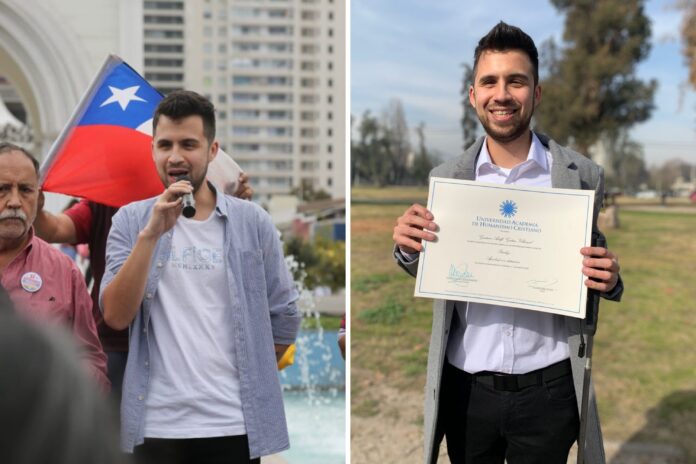I’ve participated in protests before. We used to protest every day in Chile, but then they started taking place just on Fridays. In fact, I was shot on a Friday.
In 2019, I, along with thousands of people, was protesting against the neoliberal model imposed in Chile during the civil-military dictatorship of Pinochet.
I joined my friend at the protest around 5:00 p.m. We were excited. We felt nothing could change in Chile—but the protest gave us hope that we could somehow stop the government from mistreating us.
As evening crept in, everything felt more aggressive than usual. The atmosphere was steeped in violence. My friends and I were taking photographs to document the protest and violence. I remember it was rammed and there were a lot of police from the start. Violence was breaking out on both sides. It felt like I was in a war.
At some point, maybe around 6:00 p.m., a police officer shot me in the eyes with rubberized buckshot.
At first, I was in a state of shock. I asked what was going on, and when the first responders didn’t say anything, I got a sense that things weren’t good. I knew from their silence that it was a serious injury. It was the eye doctor who eventually told me about the injuries and implications.
On a physical level, total blindness from the moment of impact led to me having to re-learn to walk, to develop other senses, and on a psychological level, learning to feel differently.
Amnesty International
Over time, I adapted to some activities better than others. For example, I can make my own coffee. However, walking in the street is tough. Our cities aren’t made for people who use a walking stick. At the moment, I am somewhere in between, but I am working hard to fully adapt.
I was shot while I was still a student, but I haven’t let it hold me back. I got my degree in 2021 and, in 2022, I started a centre for psychology with a peer from university. We opened an office in Santiago and have a lot of patients. It’s going really well. It brings me a lot of joy and fulfilment.
I am still able to protest, but I do it in a different way now. After the shooting, I met other survivors of state violence and victims of eye trauma. During the rehabilitation process, eight of us formed a band. It’s an unusual way to start a band, but we’d all been through the same experience.
We realised we could make music and do something we enjoy together. I play the drums, and there’s also a guitarist, bass player, accordion, keyboardist and singer. We’re called Hacia La Victoria—Onwards to Victory.
The fact that there is such an extensive range of musicians in the band shows how widespread human right violations in Chile are. I am still passionate about human rights and the band is a great way to protest.
We are often invited to events and protests, and it provides an opportunity to show solidarity towards other people who have also been attacked by the police. Every positive change has been conquered through protest.
I am grateful for the support that my family and I have been shown—it has helped us both. I was part of Amnesty International’s Write for Rights campaign and it was a beautiful experience.
I received physical letters from far and wide, which was rare and unique. My father read out some letters, and together, we felt supported by that solidarity. My dad, in particular, found a lot of comfort in the actions that were taken on my behalf.
Going forward, I hope to move to Southern Chile with my family and my partner. I am looking forward to moving, taking my band forwards and recording an album or going on tour with them. It would be awesome!
As for my country, it’s complicated. One of the things I loved about the 2019 protests was the way in which it brought people together. However, during the pandemic, everyone retreated to their homes—which was right, understandable and legitimate. We shifted away from solidarity and went back to the Chilean way.
I dream of a Chile that goes back to solidarity and a collective way of thinking.
On 8 November 2019, Gustavo Gatica attended a protest over rising inequality in Chile, following a wave of demonstrations and discontentment that had spread rapidly throughout the entire country.
Police repressed this protest, as well as many others, by firing at demonstrators using riot-control shotguns loaded with rubber-coated buckshot, in violation of international standards on the use of force.
Amnesty International is calling for governments to support a treaty to regulate the trade in policing equipment today to ensure it does not end in the hands of abusive police forces.
All views expressed in this article are the author’s own.
Do you have a unique experience or personal story to share? Email the My Turn team at [email protected].
Uncommon Knowledge
Newsweek is committed to challenging conventional wisdom and finding connections in the search for common ground.
Newsweek is committed to challenging conventional wisdom and finding connections in the search for common ground.


